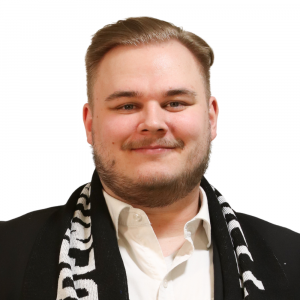BLOG: Students off from the mass production!
1.3.2023

The quality of higher education is a big issue in the upcoming parliamentary elections and in the upcoming government term. The quality and content of education must be subjected to critical scrutiny and the parties must commit to strengthening the funding of education and the level of Finnish competence that extends beyond election periods. At the moment, the situation is that the starting places in higher education institutions are being increased blindly in many fields without looking at any regional need - to be precise, 12,000 starting places have been added during the current government period. The funding for these increases has been insufficient. The share of funding per student only decreases year by year and the quality of teaching suffers. A high-quality education system is the cornerstone of our society and must not be allowed to crumble.
DEGREES SHOULD BE LESS PERFORMANCE-ORIENTED
The current funding model of universities of applied sciences is mainly based on completed degrees. This means that the starting places for students are increased, but the funding is not enough. This leads to a situation where universities of applied sciences are forced to base their entire funding on the number of degrees completed, in which case students are fed out of the schools on a conveyor belt. The focus on performance in degrees is growing intolerable and the end result is that students are already exhausted when they enter the working life. Is this what society wants from its future creators?
The funding must be developed in a direction that guides universities of applied sciences to raise the quality of education. The focus on the results of degrees should be lightened so that universities of applied sciences can admit only the number of students with which they can maintain the quality of teaching at the required level. The number of degrees should not be increased, but if this happens, the amount of funding should correspond to this development.
EDUCATIONAL RESOURCES MUST BE PUT UNDER INSPECTION
Basically, the amount of degrees for BBA Students should be reduced and related to the working life needs of the area. Working life needs must be taken into account in the branch network of universities of applied sciences, because in some areas students do not get enough internships to support their studies, and there are not enough jobs corresponding to the degree for the graduating BBA students.
The university network needs to be modified in such a way that universities of applied sciences can profile themselves more strongly than at present according to their own strengths. The branch network must also be reduced so that the resources left over from unnecessary movement between branches can be used more wisely by the teaching staff. By paying attention to the business connections in the area of campuses and universities of applied sciences, it is possible to create efficient centers of expertise that attract students.
Digitization has given us an opportunity to develop larger campus concentrations instead of maintaining a large network of offices. Resources saved from real estate can be used to improve the efficiency and quality of online teaching. However, distance and online education should not be the primary option for obtaining a degree. Digital alternatives should offer additional opportunities for versatile study alongside face-to-face teaching, making use of the digital leap taken during the pandemic.
FIX THE QUALITY OF TEACHING
At the moment, there are huge differences in the content of the training courses for BBA students between universities of applied sciences. The possibilities of digitization are not sufficiently utilized in the teaching methods, and teachers' know-how in using modern systems is too variable nationwide. It is the schools' responsibility to ensure that teachers' skills are up-to-date by organizing in-service training and to ensure that teachers have the required level of competence in introducing new teaching technologies and methods.
Different schools offer the same or similar courses, but the quality of the course content does not match. The course contents must be consistent regardless of the university of applied sciences and the implementation. In schools, teaching staff resources can be saved and duplicated work can be reduced by intensifying the cooperation between universities of applied sciences in the planning phase of courses. In the future, courses could be offered jointly by utilizing the opportunities created by digitalization.
Course feedback is important for the quality of teaching. It is given too little and it may not always be reacted at a sufficient level. Feedback systems must be developed and their utilization enhanced. Giving feedback must be included as a mandatory part of the courses and the reaction to the feedback must be transparent. The feedback should be reciprocal so that both parties can develop.
According to the feedback received, we are not just numbers; we need words and deeds, all in the name of the future.

Jesse Koivukoski
Chairperson
044 505 5612
jesse.koivukoski@tradenomiopiskelijat.fi
Advocacy team | Stakeholder group work & influencing
